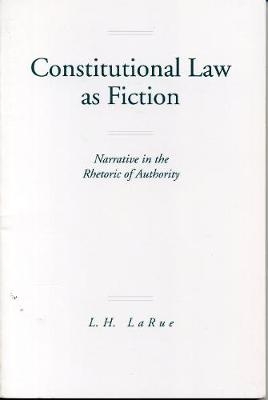
Constitutional Law as Fiction
Narrative in the Rhetoric of Authority
Seiten
1995
Pennsylvania State University Press (Verlag)
978-0-271-01407-4 (ISBN)
Pennsylvania State University Press (Verlag)
978-0-271-01407-4 (ISBN)
- Lieferbar (Termin unbekannt)
- Versandkostenfrei innerhalb Deutschlands
- Auch auf Rechnung
- Verfügbarkeit in der Filiale vor Ort prüfen
- Artikel merken
This text argues that the written opinion that explains a judgment is much like fiction, in the sense of it being a constructed meaning. Using several Supreme Court cases the author examines rhetorical techniques and contends that judges must not abandon their "fictions" but strive to improve them.
The fundamental thesis of Constitutional Law as Fiction is that in writing the opinion that explains a judgment, a judge not only analyzes and organizes precedent and makes and defends policy or value judgments, but he or she also tells a story, much as a historian does.
Like a history, this story has the appearance of simple truth, but, in fact, of necessity, it is a "fiction" as well—not in the sense of a lie or fairy tale, but in the sense of a constructed meaning. Strangely enough, these fictions persuade those who read them and those who write them, and without this persuasion, the law would lose much of its authority. L. H. LaRue examines several critical Supreme Court cases, including Everson v. Board of Education and Marbury v. Madison, and specifically examines the rhetorical techniques of Chief Justice John Marshall.
In analyzing the construction of meaning in the rhetoric of the law, LaRue ultimately contends that judges must not abandon the "fictions" in their judgments; they must strive to improve them.
The fundamental thesis of Constitutional Law as Fiction is that in writing the opinion that explains a judgment, a judge not only analyzes and organizes precedent and makes and defends policy or value judgments, but he or she also tells a story, much as a historian does.
Like a history, this story has the appearance of simple truth, but, in fact, of necessity, it is a "fiction" as well—not in the sense of a lie or fairy tale, but in the sense of a constructed meaning. Strangely enough, these fictions persuade those who read them and those who write them, and without this persuasion, the law would lose much of its authority. L. H. LaRue examines several critical Supreme Court cases, including Everson v. Board of Education and Marbury v. Madison, and specifically examines the rhetorical techniques of Chief Justice John Marshall.
In analyzing the construction of meaning in the rhetoric of the law, LaRue ultimately contends that judges must not abandon the "fictions" in their judgments; they must strive to improve them.
L. H. LaRue is Class of 1958 Alumni Professor of Law, Washington and Lee University. He is the author of A Student's Guide to the Study of Law: An Introduction (1987) and Political Discourse: A Case Study of the Watergate Affair (1988) and co-editor (with Wythe Holt) of Rewriting the History of the Judiciary Act of 1787 by Wilfred J. Ritz (1990).
| Verlagsort | Pennsylvania |
|---|---|
| Sprache | englisch |
| Maße | 152 x 229 mm |
| Gewicht | 386 g |
| Themenwelt | Geisteswissenschaften ► Sprach- / Literaturwissenschaft ► Sprachwissenschaft |
| Recht / Steuern ► EU / Internationales Recht | |
| Recht / Steuern ► Öffentliches Recht | |
| Recht / Steuern ► Privatrecht / Bürgerliches Recht ► Berufs-/Gebührenrecht | |
| ISBN-10 | 0-271-01407-5 / 0271014075 |
| ISBN-13 | 978-0-271-01407-4 / 9780271014074 |
| Zustand | Neuware |
| Haben Sie eine Frage zum Produkt? |
Mehr entdecken
aus dem Bereich
aus dem Bereich
Das umfassende Standardwerk auf der Grundlage der aktuellen amtlichen …
Buch | Hardcover (2024)
Duden (Cornelsen Verlag)
35,00 €
und wie man sie vermeidet
Buch | Softcover (2022)
C.H.Beck (Verlag)
14,00 €


